Archive for April 12th, 2011
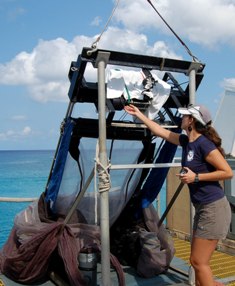
NOAA helps out in Cayman’s fish larvae count
 (CNS): Scientists aboard a National Oceanic and Atmospheric Administration (NOAA) vessel currently in Cayman waters tracking and counting blue fin tuna larvae have agreed to help track Cayman’s endangered Nassau groupers as well, Department of Environment (DoE) officials have revealed. Scientists on board the RV Gordon Gunter have responding to a request from the DoE to add the counting of grouper larvae to their work-list. Given the battle to try and preserve what is considered to be one of the cornerstone reef fish, any new knowledge about their spawning or lifecycles can help in that fight.
(CNS): Scientists aboard a National Oceanic and Atmospheric Administration (NOAA) vessel currently in Cayman waters tracking and counting blue fin tuna larvae have agreed to help track Cayman’s endangered Nassau groupers as well, Department of Environment (DoE) officials have revealed. Scientists on board the RV Gordon Gunter have responding to a request from the DoE to add the counting of grouper larvae to their work-list. Given the battle to try and preserve what is considered to be one of the cornerstone reef fish, any new knowledge about their spawning or lifecycles can help in that fight.
“We are very thankful for this concession. Nassau grouper spawning events generally occur this time of year. With NOAA’s help we can learn a lot about the prevalence and path of grouper larvae and the information can strengthen our conservation efforts,” DoE Deputy Director Tim Austin said.
NOAA researchers use a Multiple Opening and Closing Net with an Environmental Sensing System (MOCNESS) to gather samples at different ocean sites and depths. These samples are then scrutinized in an onboard laboratory as scientists look for fish larvae.
“The MOCNESS is a high-tech sampling system and is towed behind the ship with nets opening and shutting independently to sample discrete patches of water. An array of sensors mounted on the instrument frame relays water conditions up to the ship in real time.
“The data allows researchers match what they find in their samples to the physical properties of the seawater,” NOAA Research Associate Estrella Malca explained.
The RV Gordon Gunter operates primarily in the waters of the Gulf of Mexico, the Atlantic Ocean and the Caribbean Sea, conducting scientific surveys to determine the health and abundance of fishery resources and marine mammals.
The vessel docked in Grand Cayman this week to allow staff to meet their DoE counterparts. The crew also hosted a group of marine science students from Cayman Prep and High School.
For more on the ship and its crew’s activities go to www.moc.noaa.gov/gu/
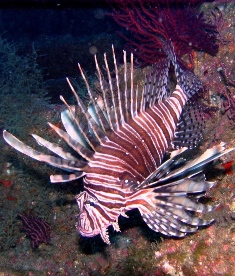
Lionfish may stress Caribbean reefs
 (Science Magazine): The extent and speed of the lionfish spread is unprecedented and may stress reefs, say scientists. "Nothing like this has been seen before in these waters," said Dr Pam Schofield, a biologist with the USGS Southeast Ecological Science Centre in Florida. "We’ve observed sightings of numerous non-native species, but the extent and speed with which lionfish have spread has been unprecedented; lionfishes pretty much blanketed the Caribbean in three short years." More than 30 species of non-native marine fishes have been sighted off the coast of Florida alone, but until now none of these have demonstrated the ability to survive, reproduce, and spread successfully.
(Science Magazine): The extent and speed of the lionfish spread is unprecedented and may stress reefs, say scientists. "Nothing like this has been seen before in these waters," said Dr Pam Schofield, a biologist with the USGS Southeast Ecological Science Centre in Florida. "We’ve observed sightings of numerous non-native species, but the extent and speed with which lionfish have spread has been unprecedented; lionfishes pretty much blanketed the Caribbean in three short years." More than 30 species of non-native marine fishes have been sighted off the coast of Florida alone, but until now none of these have demonstrated the ability to survive, reproduce, and spread successfully.
Although lionfishes originally came from the Indo-West Pacific Ocean, there are now self-sustaining populations spreading along the western Atlantic coast of the U.S. and throughout the Caribbean.
It is not yet clear exactly how the new invasive species will affect reefs in this part of the world. Foremost on the minds of scientists is the lionfishes’ predatory behavior, which may negatively impact native species in the newly invaded ecosystems.
They have already been observed preying on and competing with a wide range of native species.

Local activists call meeting to discuss public access
(CNS): A group of concerned people from the premier’s constituency have scheduled a public meeting for Thursday evening in order to discuss the issues relating to beach access and public rights of way to local waterways, among other matters. The West Bay residents, known as the Concerned Citizens Group, are inviting everyone who is legally resident in the Cayman Islands, and not just the district of West Bay, to discuss a number of issues. The recent revelations about the proposed closure of a portion of the Seven Mile Beach-West Bay Road in the Public Beach area following the purchase by the Dart Group of the land formally owned by Stan Thomas will also be on the meeting’s agenda, organisers said.
Dart has said it intends to develop the old Courtyard Marriott site into a new resort but has requested that the road be moved in order to create a beach front area.
Government has said it supports the idea and in exchange for Dart financing the road project it has offered the island’s biggest investor a piece of crown land in return, although the exact lot has not yet been revealed.
The group said it proposes to discuss the specific access issues but also other related matters during the public meeting at the John Gray Memorial Church Hall by the four-way stop in West Bay at 7pm 14 April. The chair of the group urged people to attend as they said these issues affected the present and the future of the Cayman Islands and addressing them was in the hands of the people.

Bush justifies foreign travel
 (CNS): The Cayman Islands premier has said that he is forced to travel in order to protect Cayman from the global pressures from onshore jurisdictions and to find new business for the local economy. Denying that he enjoys the overseas trips, McKeeva Bush said no one else could “tell our story as well as we do” as he justified his latest travels, which included a stop in Washington to discuss the latest challenges to the offshore industry. Bush said Cayman’s presence at the table was important when it came to protecting the financial sector because when the Cayman Islands was silent it created a vacuum which was filled with the same old rhetoric. He told those who criticised him on the blogs and on the radio that he had a job to do. (Photo Dennie Warren Jr )
(CNS): The Cayman Islands premier has said that he is forced to travel in order to protect Cayman from the global pressures from onshore jurisdictions and to find new business for the local economy. Denying that he enjoys the overseas trips, McKeeva Bush said no one else could “tell our story as well as we do” as he justified his latest travels, which included a stop in Washington to discuss the latest challenges to the offshore industry. Bush said Cayman’s presence at the table was important when it came to protecting the financial sector because when the Cayman Islands was silent it created a vacuum which was filled with the same old rhetoric. He told those who criticised him on the blogs and on the radio that he had a job to do. (Photo Dennie Warren Jr )
He explained that he was in Washington with a delegation to address the new Foreign Account Tax Complaint Act (FATCA), which will impact Americans with dual citizenship and Caymanians with green cards. Bush said the Cayman officials met with the IRS and the US Treasury because it was a very serious matter, as well as a number of other relevant government officials. The new reality, he said, was that Cayman had to be proactive in engaging with international partners in order to maintain competitive edge.
“We can do some of that by telephone, fax and emails, if you may, but most of it has to be done sitting down talking with them,” the premier told the people of North Side on Monday evening at the third of his town hall meetings as he answered community criticisms of his travelling. “I know there are complaints that I am off the island at times. Well, when something happens and Cayman’s name is called and these islands are questioned … someone needs to there,” Bush said.
He pointed out that he was not just the premier but also a minister with responsibility for many areas. “If I’m not there and Cayman is challenged then we have to take care of the fallout and clean up. The best position is when someone is at table to discuss matters. So those on the blogs and the radio show who criticize and carry-on, well let them go ahead. I have a job to do,” he said.
He warned that if Cayman didn’t maintain relationships, the G20 were eager to put pressure on Cayman, and that it had nothing to do with him wanting to travel. He said when he gets on a plane he prayed, but the need to fly was par for the course. Bush said he doubted that what local politicians would say here about the US policy would have any influence. “We must get out of the box and go to the policy makers and ask questions, clarify concerns and bring them evidence of what our jurisdiction stands for.”
He praised Sidley Austin, the law firm the Cayman Islands has retained to represent its interests on Capitol Hill and in Europe.
Bush also justified the trip to Dubai with the Hon development team as he said they toured the specialist economic zones there. He said the goal to develop a specialist technology park in Cayman would create thousands of jobs and bring in millions of dollars for the economy. Describing it as a medium to long term project, he said the Cayman Islands had to plan.
“We have hundreds of kids coming out of school looking jobs and wanting scholarships. We can’t depend on the financial sector; we have to diversify the economy and this will be part of that attempt,” Bush said.
LA ruling raises concerns
(CNS): A ruling made by the Speaker of the Legislative Assembly on Monday is of significant concern, the leader of the opposition has said, as it goes the very heart of parliamentary privilege. Following a heated dispute on Friday between opposition and government benches over correspondence between the then PPM government and CUC relating to the licence negotiations, the speaker has introduced a new ban on members using certain types of documents in the LA. The speaker said sources of documents used in debates must be revealed and letters can’t be used unless the senders or recipients have given permission. Alden McLaughlin pointed out that this could seriously constrain the opposition’s ability to fulfil its role to challenge government actions.
In her ruling made in the LA at the start of proceedings yesterday, 11 April, Speaker Mary Lawrence said that correspondence between two parties cannot be introduced into a debate in the LA unless clearance has been received from the parties concerned. “The use of confidential documents; papers either from cabinet, government, private sector, business, banks etc. will not be allowed on the floor of this House while I sit in this chair,” she stated.
Speaking after the Legislative Assembly was adjourned on Monday afternoon, the opposition leader said he was very worried that this ruling would prevent him and his PPM colleagues as well as the independent member from challenging government over issues that may be questionable. It could also undermine their ability to pursue information given to them by whistleblowers under the cover of anonymity.
“This is the very stuff that opposition is made of,” McLaughlin pointed out, referring to documentation that may come their way from people concerned about a particular government action. McLaughlin said he would be writing to the speaker setting out his concerns that this could be a breach of parliamentary privilege.
He explained that the whole point of the protection afforded MLAs from law suits was to enable them to be free and frank in their discussions and to allow awkward or difficult issues to be raised in the course of debate.
“If someone comes and says, here is a scandal and here is the letter, if the speaker enforces this ruling, we will be prevented from using a document that may expose wrongdoing in the legislature,” he said, adding that in those circumstances the opposition would have to consider other options to then question government.
“Part of the reason why parliamentary privilege exists,” he explained, “is to protect members in difficult situations and allow them to probe without fear of legal action when talking about what could be serious scandals or matters of national importance. It is part of our job to challenge and raise questions and draw attention to issues. This ruling threatens that right,” McLaughlin added.
In her statement to the legislators in which she implemented the ban she also reminded members that the conduct of the presiding officer (namely, the speaker), along with members of the royal family, the governor, judges and other officers of the crown could not be raisedor impugned expect during a substantive motion.
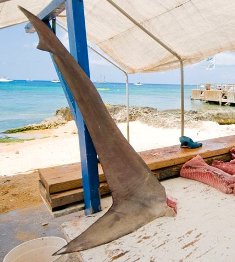
Sharks not protected despite endangered status
 (CNS): Following enquiries by some members of the public about the sale of a scalloped hammerhead shark at Cayman’s fish-market, the Department of Environment (DoE) has said that, despite the fact that globally shark populations are severely threatened with overfishing, there are currently no laws prohibiting the capture or sale of any sharks in the Cayman Islands. Officials said that fishermen often take great care to avoid hooking these animals. Sharks that are accidentally caught are often sold for meat so as not to waste the animal but it is rare that a shark is killed just for the sake of it and they are protected in marine zones.
(CNS): Following enquiries by some members of the public about the sale of a scalloped hammerhead shark at Cayman’s fish-market, the Department of Environment (DoE) has said that, despite the fact that globally shark populations are severely threatened with overfishing, there are currently no laws prohibiting the capture or sale of any sharks in the Cayman Islands. Officials said that fishermen often take great care to avoid hooking these animals. Sharks that are accidentally caught are often sold for meat so as not to waste the animal but it is rare that a shark is killed just for the sake of it and they are protected in marine zones.
Buyers of shark meat should, however, be aware of the potential health risk of eating the flesh because it contains high levels of trace metals such as mercury, which if ingested frequently can become toxic to humans. Furthermore, sharks build up a concentration of ammonia.
Although several species of sharks are occasionally caught in Cayman they are not considered to be a target species.
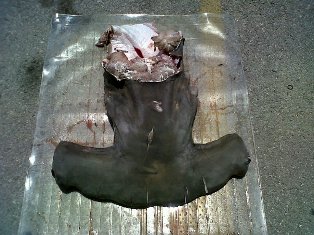 “There is legislation prohibiting the baiting or chumming of water with the intent of attracting sharks but this is primarily aimed at shark feeding activities. Sharks are of course protected within local Marine Parks and the Environmental Zones but as most species range over much larger areas than the boundaries of the parks, marine protected areas offer little protection for sharks generally,” DoE officials said.
“There is legislation prohibiting the baiting or chumming of water with the intent of attracting sharks but this is primarily aimed at shark feeding activities. Sharks are of course protected within local Marine Parks and the Environmental Zones but as most species range over much larger areas than the boundaries of the parks, marine protected areas offer little protection for sharks generally,” DoE officials said.
Although sharks are often thought of as dangerous to humans, more and more evidence has shown that they are in fact reclusive and avoid coming into contact with people as much as possible.
Hammerheads are particularly sensitive to the proximity of other large animals and humans due to the number of electro-sense pores these sharks have across their face, making them some of the rarest sharks to encounter on a dive.
Globally all shark populations have declined dramatically, including the scalloped hammerhead, which the International Union for Conservation of Nature (IUCN) lists as endangered. This means this type of shark is considered to be facing a very high risk of extinction in the wild. Locally these sharks were sighted with more regularity no more than a decade ago. However, in recent years sightings have diminished for unknown reasons and the current status of local populations of scalloped hammerheads remains largely undetermined.
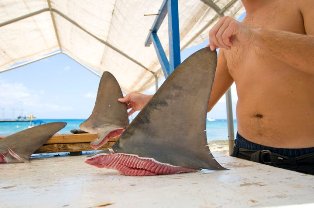 Regionally the scalloped hammerhead is known to have declined drastically (by around 98%, IUCN) and it is thought that this is largely due to increased commercial fishing pressure targeting mainly tunas and billfish, the DoE’s experts stated. Other shark species facing similar declines in the Caribbean include the great hammerhead and oceanic whitetip (99% declines since the 1950’s in the Gulf of Mexico alone).
Regionally the scalloped hammerhead is known to have declined drastically (by around 98%, IUCN) and it is thought that this is largely due to increased commercial fishing pressure targeting mainly tunas and billfish, the DoE’s experts stated. Other shark species facing similar declines in the Caribbean include the great hammerhead and oceanic whitetip (99% declines since the 1950’s in the Gulf of Mexico alone).
“Given the importance of a robust shark population in a healthy marine ecosystem, the Department of Environment is currently involved in a 2 year collaborative study with Marine Conservation International (MCI), the Guy Harvey Research Institute (GHRI) at Nova Southeastern University and the Save Our Seas to better understand the current status of sharks in our local waters,” the DoE said in a release following the public concern about the sale of the shark at the local market.
The project is funded by the UK’s Overseas Territory Environment Programme (OTEP) and the Save Our Seas Foundation and will result in comprehensive managementrecommendations to ensure sharks receive the protection and recognition they so desperately require.
To learn more about DOE’s efforts to understand local shark populations around the Cayman Islands or report a shark sighting please visit the DOE’s website at www.doe.ky or alternatively join the DOE’s Facebook group ‘Sharks & Cetaceans: The Cayman Islands.’

Fresh suits filed in Cayman Islands in Saudi dispute
 (Financial Times): A multibillion-dollar dispute between two of Saudi Arabia’s largest family-owned conglomerates is set to intensify, with fresh suits filed or about to be filed in California and the Cayman Islands. Saad Group, which is owned by Saudi billionaire Maan al-Sanea, and the Algosaibi family, one of the most prominent in the Gulf, have waged a legal battle across several continents since mid-2009, when it emerged that both were struggling to repay debts of more than $20bn. Ahmad Hamad Algosaibi and Brothers has accused Mr Sanea of “massive fraud” that it claims could amount to much as $10bn, and has launched legal actions in the Cayman Islands, New York and London against the Saudi billionaire and Saad Group. Mr Sanea, who is related to Ahab’s owners through marriage, has vigorously denied the allegations.
(Financial Times): A multibillion-dollar dispute between two of Saudi Arabia’s largest family-owned conglomerates is set to intensify, with fresh suits filed or about to be filed in California and the Cayman Islands. Saad Group, which is owned by Saudi billionaire Maan al-Sanea, and the Algosaibi family, one of the most prominent in the Gulf, have waged a legal battle across several continents since mid-2009, when it emerged that both were struggling to repay debts of more than $20bn. Ahmad Hamad Algosaibi and Brothers has accused Mr Sanea of “massive fraud” that it claims could amount to much as $10bn, and has launched legal actions in the Cayman Islands, New York and London against the Saudi billionaire and Saad Group. Mr Sanea, who is related to Ahab’s owners through marriage, has vigorously denied the allegations.
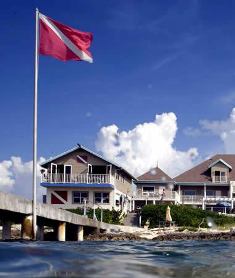
DoT encourages local industry to green
 (CNS): The Department of Tourism (DoT) is making a concerted effort to push the Cayman Islands Environmental Project for the Tourism Sector (CEPTS), a joint venture between the department and the private sector, as it enter s its second phase. The goal is to encourage local tourism business to aim for Green Globe Certification for their hotel or service. Officials said the progamme was part of the government’s goal to market the Cayman Islands as a responsible tourism destination, committed to sustainable development. The DoT will be holding a green fair this week to promote the programme to tourism partners, it said in a release.
(CNS): The Department of Tourism (DoT) is making a concerted effort to push the Cayman Islands Environmental Project for the Tourism Sector (CEPTS), a joint venture between the department and the private sector, as it enter s its second phase. The goal is to encourage local tourism business to aim for Green Globe Certification for their hotel or service. Officials said the progamme was part of the government’s goal to market the Cayman Islands as a responsible tourism destination, committed to sustainable development. The DoT will be holding a green fair this week to promote the programme to tourism partners, it said in a release.
Racquel Brown, Tourism Development Services Manager at the DoT, encouraged industry partners, including properties, attractions, service-based businesses or watersports operators, to attend the Living Green Fair on the Governor’s Lawn on Thursday, 14 April between 11am and 6pm. “At that event, tourism partners will be able to learn more about the CEPTS programme and what it means for their business to obtain Green Globe Certification,” she said.
Last June, the Queen Elizabeth II Botanic Park, Southern Cross Club, Little Cayman Beach Resort, Pirates Point Resort, Cobalt Coast Resort & Suites and Compass Point Dive Resort all successfully completed the pilot phase of the CEPTS programme.
Each establishment had to undergo an environmental assessment, apply a number of standards and environmental best practices and submit to a strict audit by an independent third party. The end result of this process was the achievement of the coveted Green Globe Certification, an internationally recognised designation in the travel, tourism and hospitality industry that demonstrates a commitment to the environment and sustainable operations and management.
Congratulating all pilot properties on completing the first phase of the CEPTS programme, the premier, who is also the tourism minister, said, “This is a significant achievement for the Cayman Islands and shows that our country is becoming more environmentally conscious.”
He added that his government was fully supportive of this initiative and would continue to play its part in encouraging all of tourism industry partners to adhere to the highly-respected Green Globe standards.
Although discussing the green initiative and its importance, Bush did not state when the long awaited national conservation law would be passed, which would offer real protection to the islands’ environment. He did, however, applaud the industry leaders who have completed the first phase of the CEPTS programme and encouraged others to visit the Living Green fair to learn more about the benefits of such an accreditation.
West Bay MLA Cline Glidden said that as more consumers seek destinations and establishments that are environmentally friendly, being able to display the Green Globe on their website and marketing materials is an incredible badge of honour for the properties and attractions.
The variety of green initiatives implemented by the six industry leaders included appointing Green Teams; educating staff members on the importance of the programme and instituting standards such as recycling bottles, paper and oil, reusing materials, linens and water; and reducing waste and energy-use.
After successfully applying 133 Green Globe Certification standards, the Queen Elizabeth II Botanic Park was the first to complete certification and is the only attraction of its kind in the Caribbean region to attain Green Globe Certification. By obtaining the certification, the QEII Botanic Park, a non-profit statutory body dedicated to preserving natural environments and places of historic significance in the Cayman Islands, has saved at least 6,000 gallons of water per month and an overall cost savings of 10-12 percent.
Cobalt Coast Resort & Suites and Compass Point are both dive resorts owned and operated by a management team that prides themselves in being ambassadors of sustainable practices in the industry, and while Compass Point only received their Green Globe certification recently, the dive resort has been realigning their company’s operations to be more environmentally-conscious from as far back as 2008.
“As a dive resort, we are already dealing with concerned clientel, so going the extra mile to operate in a more responsible and concerned manner fits in perfectly,” said Airie Barendrecht, proprietor of Cobalt Coast.
Little Cayman Beach Resort and Southern Cross Club have been considering their individual environmental impact for many years and have since been implementing various methods to reduce their carbon footprint. Now both official Green Globe Certificate holders, the properties have found innovative ways to play their part in making their location as eco-friendly as possible.
Peter Hillenbrand, proprietor of Southern Cross Club stated, “Making the commitment to being green is not easy, however my staff members enjoy being part of the new initiative, which is proving to be very cost-effective.”
Cobalt Coast and Little Cayman Beach Resort also instituted a Green Team to monitor the programme and reward persons who engage in efficient environmental practices. “It feels really good to be one of the first properties making a difference in the Sister Islands,” said Jason Belport, General Manager at Little Cayman Beach Resort. “It is important to keep the environmental integrity of the Sister Islands intact and I look forward to seeing other properties across all three of the Cayman Islands demonstrating a higher level of environmental commitment.”
Shomari Scott, Acting Director of Tourism, who’s team at the DoT introduced and managed the implementation of the programme, stated that certification came at a price for those involved in Phase I of the CEPTS programme and all had to work extremely hard to complete the pilot phase.
“Essentially, the five properties and one attraction that participated in Phase I blazed the trail and are leading the way in sustainable tourism in the Cayman Islands. I applaud their efforts and encourage them to continue to work hard to turn their green efforts into long-term benefits for staff and guests alike,” he added.
Tourism entities interested in enhancing their environmental performance and becoming Green Globe Certified are encouraged to visit www.GreenGlobe.com or contact the Department of Tourism at 949-0623 or cepts@caymanislands.ky.
Green Globe is a worldwide green certification based on internationally accepted criteria for efficient operations and improved environmental performance of travel and tourism businesses. Operating under license, Green Globe Certification is based in California, USA and operates in over 83 countries. Green Globe is the only certification company to be an affiliate member of the United Nations World Tourism Organization (UNWTO), is partly owned by the World Travel and Tourism Council (WTTC) and a member of the Caribbean Alliance for Sustainable Tourism (CAST) governing council. Green Globe Certified businesses are recognised by AAA (American Automobile Club), British Airways Holidays, Air Canada Vacations, Travelocity, and other tour operators. Certified businesses are also promoted across all Green Globe websites, including www.GreenGlobe.Travel, and in the popular travel magazine ‘Islands’.
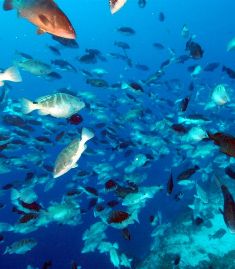
Marine scientist joins call for grouper ban extension
 (CNS): Underwater scientist, Josh Stewart, has joined the call for the ban on fishing at the Little Cayman grouper hole during spawning season to be extended. Working with researchers from the Grouper Moon Project, Stewart is helping with public education, outreach blogging and writing articles for international diving magazines about the last-known intact spawning area of Nassau grouper in the world. The ban which has protected this precious resource for almost ten years will run out at the end of this year and Stewart has joined the Department of Environment (DoE) in the campaign to ensure the protection during spawning remains in place until. Without an extension the species could be lost forever. (Photo Phil Bush)
(CNS): Underwater scientist, Josh Stewart, has joined the call for the ban on fishing at the Little Cayman grouper hole during spawning season to be extended. Working with researchers from the Grouper Moon Project, Stewart is helping with public education, outreach blogging and writing articles for international diving magazines about the last-known intact spawning area of Nassau grouper in the world. The ban which has protected this precious resource for almost ten years will run out at the end of this year and Stewart has joined the Department of Environment (DoE) in the campaign to ensure the protection during spawning remains in place until. Without an extension the species could be lost forever. (Photo Phil Bush)
“This is the last-known intact spawning mass of Nassau grouper in the Caribbean, and thus the world,” Stewart wrote in his blog. “All other aggregations, some of which may have exceeded 100,000 fish, have been systematically wiped out by fishing during the spawning period."
He explained to the worldwide web audience that this was down to the protection offered for the better part of a decade. However, despite its fame and ecological importance, protection for the grouper hole is set to run before 2012.
“Come December 2011, this invaluable protection will end unless government elects to renew current fishing bans. Protecting Nassau grouper ‘capital’ by protecting the spawning aggregation ensures a healthy fish stock that will keep fishermen in business for years to come,” Stewart said.
The DoE has already called for an extension as it says lengthening the ban will ensure local fisherman can continue to fish grouper into the future.
“For now, spawning numbers are dangerously low and without a ban, we could see the grouper disappear from our waters altogether in the next five years,” warned Gina Ebanks-Petrie. “It is not a ban on fishing grouper; it is just a ban on fishing them while they are spawning.”
She explained that unrestricted fishing of grouper and their spawning aggregations in the waters off Grand Cayman and Cayman Brac had already brought those populations close to extinction.
“The same is true for the rest of the Caribbean, which prompted the International Union for Conservation of Nature (IUCN) to list the Nassau grouper as endangered,” the DoE boss said. “The fact is, the Nassau grouper population off Little Cayman is likely the most plentiful anywhere in regional waters and therefore needs all the protection it can get.”
The Nassau grouper (Epinephelus striatus) is thought to be an ecological and economic cornerstone of Caribbean coral reefs. Since 2004, a seasonal fishing ban has been in effect in all designated grouper spawning areas around the Cayman Islands.
Bans in any of the designated grouper spawning areas run from November through March. Off Grand Cayman, these areas are located at Coxswain Bank, East End and South West Point’s Sand Cay. Around Cayman Brac and Little Cayman they are found at the east and west ends of the islands. The northeast and southwest ends of 12-Mile Bank are also protected.
Government makes key changes to offshore laws
(CNS): Updated –Cayman’s premier pushed through three important pieces of legislation yesterday, which he said would help the country’s financial sector be more competitive. In the first set of amendments in what will be a number of changes to modernise the laws dealing with the offshore industry, McKeeva Bush introduced thirteen new provisions in the Companies Law, as well as amendments to companion legislation. He said the changes followed considerable consultation with the private sector to help make the Cayman Islands more attractive on the global stage. These and future amendments would help the jurisdiction stay at the forefront of the industry relating to company registration, he added.
He said that Cayman’s success in the past had been down to its ability to change the Companies Law and similar legislation in response to global challenges and competition, as well as changes in regulation. Bush added that the latest changes were critical to the future of the sector and address a diversity of concerns from the uncertainty over mergers to the transfer of shares electronically as well as issues like providing for foreign script dual names onlegal documents without direct translations.
“The provisions have a sound rationale and there has been extensive consultation with the industry,” the premier told his legislative colleagues in the Assembly on Monday morning (11 April). He added that the changes reflected the dynamic relationship which existed between government and the private sector which would create further opportunities for growth.
Bush said that people had to be innovative to succeed on the modern stage. “That’s what it takes these days when there is lots of competition and challenges,” he added. “The only way to survive is to be innovative.”
Alongside The Companies (Amendment) Bill 2011, The Securities Investment Business (Amendment) Bill 2011 and the Property (Miscellaneous Provisions) Bill 2011 were also passed through with support from the opposition as well as the government benches.
In a release from the ministry, Charles Jennings, Chairman of the Financial Services Legislative Committee added that amendments showed that the purpose of the Committee, to propose and draft new laws and amendments to enhance the jurisdiction’s reputation as a leading financial services centre, had been achieved. "The Committee looks forward to being able to continue its work in partnership with the Government, the Companies Law amendments being the first of several proposals that the Committee is currently working on," the former Maples partner stated.
Speaking at a public meeting in North Side in the evening the premier told the people that these laws were expected to increase the attractiveness of Cayman and gain ground against competitors. He spoke of the significance of having the private and public sectors working together to enhance the jurisdiction and the diversification of the economy.
He noted that while tourism and finance were the two vital and long standing pillars of the local economy the country could no longer expect to see the kind of growth in those industries as in the past.
“It is important when we are challenged on what we do here to amend laws to stay competitive,” Bush stated. “There are many, many competitors. All those little islands that were once agriculture based are doing finance business. We can’t sit down and do nothing, we have to be innovative…..We can’t fight G20.We have to be transparent with the right legislation and keep our nose clean.”